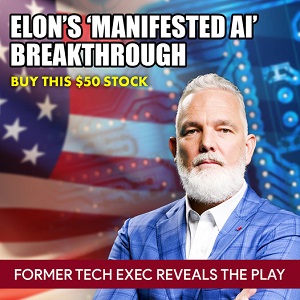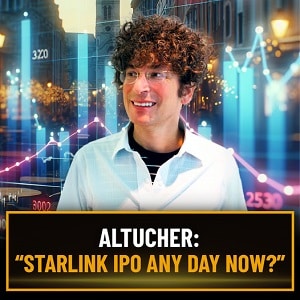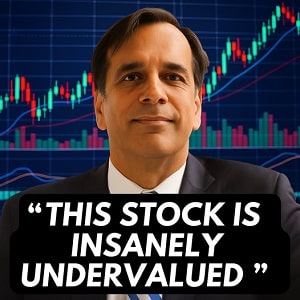Imagine a world where your iPhone connects seamlessly to high-speed internet anywhere on Earth—whether you’re in a bustling city, a remote mountain, or the middle of the ocean. This isn’t science fiction; it’s the vision behind Apple’s secretive “Project Orion,” a revolutionary leap that could redefine global connectivity.
World-renowned investor Alexander Green, Chief Investment Strategist at The Oxford Club, has uncovered what he believes is Apple’s boldest move since the iPhone—a project so transformative it could create generational wealth for those who act now.
In a recent interview with Bill Tucker, Green shared insights from two years of tracking this monumental story. Named after the Orion constellation, visible globally, Project Orion aims to deliver a “second internet” via satellite, bypassing traditional cables and cell towers.
Green predicts this could disrupt a $1.8 trillion market by 2035, dwarfing the current smartphone industry Apple already dominates. But here’s the twist: Green isn’t recommending Apple stock. Instead, he’s pinpointed a tiny, little-known company partnering with Apple—a company poised for explosive growth, potentially delivering 3,000% returns or more by 2030.
Below, I’ll dive deep into Green’s revelations, exploring why Project Orion could be Apple’s biggest disruption yet, the massive investment potential, and how you can access the full details through a subscription to The Oxford Communiqué.

Alexander Green: The Investor Who Spots Winners Early
When it comes to spotting market-defining opportunities, few match Alexander Green’s track record. Over three decades, he’s predicted some of the biggest wealth-building moments in tech history. In the early 1990s, Green bought Apple shares at under $1 (split-adjusted), foreseeing the iPhone’s impact years before its 2007 launch. A $5,000 investment then turned into over $5 million—a 100,000% gain. He also called Netflix at $1.62 before streaming, Amazon at under $2 pre-Prime, and other explosive plays like Celsius Holdings (3,300% gain) and Tandem Diabetes Care (1,225% in 18 months).
Green’s foresight extends beyond stocks. He predicted the 2008 market crash, called the 2020 post-COVID boom, and nailed trade war opportunities in 2025, leading to massive gains in stocks like Palantir. His secret? A disciplined five-trigger system: consecutive revenue growth, insider buying, institutional interest, market momentum, and disruptive innovation. The mysterious company behind Project Orion checks every box, making it a prime candidate for life-changing returns.
Through The Oxford Communiqué, Green shares these high-conviction picks with subscribers, focusing on small, innovative companies partnering with tech giants. By subscribing, you gain access to his exclusive report, “Apple’s Space Partner,” revealing the company at the heart of Project Orion. Don’t miss this chance to get ahead of Wall Street—click here to join now.
What Is Project Orion? Apple’s Connectivity Revolution
Project Orion is not about AI, virtual reality, or quantum computing—it’s about connectivity. Green reveals that Apple has embedded a hidden technology in over 1 billion iPhones, ready to be activated. This technology, detailed in a little-noticed patent (#11528076 B1), involves special antennas that connect directly to low-Earth orbit (LEO) satellites, delivering high-speed internet and cellular service anywhere. No cables, no cell towers—just seamless access.
Today’s internet relies on fragile infrastructure: fiber optics, undersea cables, and towers that fail during storms like Hurricane Irma, which cut service for 7 million. Globally, outages cost businesses $400 billion annually, and 2.9 billion people—over a third of humanity—lack internet access. In rural areas, installation costs can hit $42,000, with monthly fees of $150 or more. Even in urban centers, 51% of U.S. businesses lose $1 million monthly from connectivity issues.
Project Orion changes everything. By leveraging satellites as “cell towers in space,” Apple could eliminate dead zones (affecting 16% of the U.S.) and slash consumer costs. Green predicts Apple aims to become its own carrier, cutting out middlemen like AT&T and Verizon, who rake in $157 monthly per user while Apple earns only from device sales. With a potential $200 billion slice of the U.S. wireless market up for grabs, Project Orion could be bigger than the iPhone’s 2007 debut.
Why now? Apple’s Emergency SOS via satellite, launched in 2022 and free through 2025, hints at what’s coming. Green believes Apple is poised to “flip a switch,” enabling full internet, messaging, and calls for 1.3 billion iPhone users. The market potential is staggering—McKinsey projects a $1.8 trillion space economy by 2035. To uncover the small company powering this revolution, subscribe to The Oxford Communiqué and get Green’s full report.
Why Apple Needs a Tiny Partner—and Why It’s Your Opportunity
At a $3 trillion market cap, Apple’s stock is unlikely to deliver 3,000% gains—it would need to hit $6 trillion, larger than Japan’s economy. Instead, Green points to a small company, 800 times smaller than Apple, that holds the key to Project Orion’s success. This partner owns something Apple can’t buy or replicate: exclusive spectrum rights, the “invisible highways” that wireless signals travel.
Spectrum is scarce—once allocated, it’s locked in. This company secured its spectrum in the 1990s, approved by global bodies like the FCC, 3GPP, and ITU. It’s perfect for phone-satellite connections, uncrowded and reliable. Apple has invested $1.5 billion, taking a 20% stake and securing 85% of the company’s network capacity, signaling deep commitment.
This isn’t just a supplier—it’s a critical partner. Historical examples show why this matters. When Apple launched the iPhone, suppliers like Cirrus Logic (2,000% gain), Micron Technology (2,000%), Skyworks Solutions (2,400%), and Broadcom (16,000%) soared. Non-Apple cases, like Plug Power (3,000% with Amazon) and MicroVision (9,000% with Microsoft), highlight the potential when small companies align with giants.
Green estimates this partner could see 3,000% returns by 2030, driven by revenue from 1.3 billion iPhones. If just half use satellite connectivity at $1/month, that’s $7.8 billion annually—compared to the company’s current $250 million. The stock surged 30% in a day when Apple’s investment was announced in 2024. Want to know the company? Join The Oxford Communiqué for Green’s exclusive report.
Why This Beats Competitors Like Starlink
Elon Musk’s Starlink offers satellite internet but requires a $499 bulky device and $165 monthly fees. Apple’s solution is elegant: no extra hardware, just your iPhone. Green compares Starlink to BlackBerry, which dominated smartphones until the iPhone’s touchscreen simplicity crushed it. Starlink’s CEO dismissed touchscreens; Musk offered Apple a deal in 2022, but Apple chose this smaller partner for its unique spectrum and seamless integration.
When Apple unveils Project Orion, Green predicts a market shakeup. Traditional carriers could crumble as Apple captures recurring revenue. The partner’s stock, still under Wall Street’s radar, could skyrocket. Subscribe now to learn its identity before the announcement.
The Broader Impact: A New Space Economy
Project Orion’s implications extend beyond telecom. Real-time package tracking mid-ocean, crop monitoring in remote areas, emergency calls from anywhere, and banking for 1.7 billion unbanked people are just the start. The space sector is booming—Redwire up 400%, Rocket Lab 725%, and AST SpaceMobile 900% since 2024. Green’s pick, valued far below competitors, could leap 466% to match their valuations.
This isn’t hype. Green’s 30-year career avoids bubbles, focusing on real technology. His five-trigger system—revenue growth, insider buying ($34.5 million in 24 months), and disruption—confirms this company’s potential. Don’t wait for Wall Street to catch up.
Join The Oxford Communiqué for the full scoop.
Risks to Consider Before You Act
Investing carries risks. Green emphasizes: never invest more than you can afford to lose. The partner’s reliance on Apple (85% capacity), stock volatility, and competition from Starlink or AST SpaceMobile are factors. Regulatory hurdles or unexpected partnerships (e.g., rumored Apple-SpaceX talks in 2025) could impact outcomes. Yet, Apple’s $1.5 billion stake and long-term commitment suggest confidence. Green’s report details these risks—subscribe to weigh them fully.
How to Seize This Opportunity
To access the company behind Project Orion, join The Oxford Communiqué for just $99 (a discount from $249–$275). You’ll receive:
- “Apple’s Space Partner” Report: Full details on the company, why it’s poised for 3,000% gains, and how to invest.
- Monthly Issues: Green’s top stock picks.
- 24/7 Portfolio Access: Track his recommendations.
- Weekly Clubroom Sessions: Live market insights from Green and experts.
- 30-Day Guarantee: Full refund if unsatisfied, keep all reports.
Conclusion: Don’t Miss Your Moment
Project Orion could be Apple’s most disruptive move yet, transforming connectivity and creating a $1.8 trillion market. Alex Green’s small-cap partner is the key to massive gains, but the window is closing. With Wall Street asleep and media clueless, now is your chance to get ahead.
Subscribe to The Oxford Communiqué, get “Apple’s Space Partner,” and position yourself for generational wealth. Join now—because timing is everything.
Frequently Asked Questions About Apple’s Project Orion and Alex Green’s Investment Opportunity
What is Apple’s Project Orion?
Project Orion is the codename for Apple’s secretive initiative to revolutionize global connectivity by enabling iPhones to connect to high-speed internet and cellular services via low-Earth orbit (LEO) satellites. It aims to eliminate dead zones, bypass traditional infrastructure like cables and cell towers, and potentially disrupt the $1.8 trillion space economy by 2035, as forecasted by McKinsey.
Why is Project Orion considered a game-changer?
Unlike traditional internet reliant on fragile cables and towers, Project Orion uses satellite technology already embedded in over 1 billion iPhones. This could provide seamless connectivity anywhere—rural areas, oceans, or disaster zones—potentially allowing Apple to become its own carrier and capture a slice of the $200 billion U.S. wireless market.
Who is Alexander Green, and why should I trust his insights?
Alexander Green is The Oxford Club’s Chief Investment Strategist with over 30 years of experience. He’s known for early calls on Apple (100,000% gain), Netflix, Amazon, and others, plus accurately predicting market events like the 2008 crash and 2020 boom. His five-trigger system identifies high-potential stocks, making his Project Orion pick compelling.
Why isn’t Alex Green recommending Apple stock for Project Orion?
At a $3 trillion market cap, Apple’s stock is unlikely to deliver life-changing gains (e.g., 3,000% would require a $6 trillion valuation). Instead, Green focuses on a small company, 800 times smaller than Apple, that’s critical to Project Orion’s success, offering massive upside potential due to its pivotal role and low valuation.
What makes this small company so important to Project Orion?
This company owns exclusive spectrum rights—scarce “invisible highways” for wireless signals—essential for connecting iPhones to satellites. Secured in the 1990s and approved globally, these rights are irreplaceable. Apple has invested $1.5 billion, taking a 20% stake and locking in 85% of the company’s network capacity.
How could this company achieve 3,000% returns by 2030?
With 1.3 billion iPhones potentially using satellite connectivity, even $1/month from half yields $7.8 billion annually for the company, compared to its current $250 million. Historical examples like Broadcom (16,000% post-iPhone) show small partners can soar. Green’s five-trigger system—revenue growth, insider buying, and disruption—supports this projection.
How does Project Orion compare to Starlink?
Starlink requires a $499 device and $165/month fees, while Project Orion integrates directly into iPhones, needing no extra hardware. Green compares Starlink to BlackBerry, which was overtaken by the iPhone’s simplicity. Apple’s partner has unique spectrum, giving it an edge over competitors like SpaceX.
What are the risks of investing in this opportunity?
Investing involves risks, including stock volatility, reliance on Apple (85% capacity), and competition from Starlink or AST SpaceMobile. Regulatory hurdles or unexpected partnerships (e.g., rumored Apple-SpaceX talks in 2025) could impact outcomes. Always invest only what you can afford to lose.
How can Project Orion impact industries beyond telecom?
It enables real-time package tracking mid-ocean, crop monitoring in remote areas, emergency services anywhere, and banking for 1.7 billion unbanked people. The space economy’s growth (e.g., Redwire up 400%, Rocket Lab 725%) underscores its transformative potential across sectors.
How can I learn the identity of Apple’s Project Orion partner?
Alex Green reveals the company in his exclusive report, “Apple’s Space Partner,” available through a subscription to The Oxford Communiqué. For $99, you get the report, monthly stock picks, portfolio access, weekly Clubroom sessions, and a 30-day money-back guarantee.
Why should I act now?
Green predicts Apple could announce Project Orion soon, potentially sending the partner’s stock soaring. Past examples (e.g., Immunogen up 144% in a day) show delays can mean missing big gains. Wall Street is unaware, giving early investors an edge before mainstream media catches on.


































